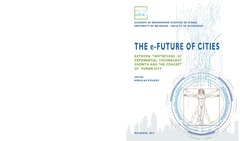Prikaz osnovnih podataka o dokumentu
The New Industrial Policy of Serbia and Possible Consequences on Urban Development
| dc.creator | Zeković, Slavka | |
| dc.date.accessioned | 2019-11-07T08:11:24Z | |
| dc.date.available | 2019-11-07T08:11:24Z | |
| dc.date.issued | 2019 | |
| dc.identifier.isbn | 978-86-6283-084-5 | |
| dc.identifier.uri | https://raumplan.iaus.ac.rs/handle/123456789/508 | |
| dc.description.abstract | The aim of the paper is to explore the perspectives of the new industrial policy of Serbia (in line with the Fourth Industrial revolution/4IR) and its un/predictable impacts on cities. It will discuss the main requirements of the 4IR (the expected shifts, challenges and effects) and the European concept of the “Research and Innovation Systems”/RIS as the multi-dimensional framework for the national “Strategy of Smart Specialization”/S3. These concepts have an important role for urban development, urban policy and urban economy. The paper indicates that the relationship between the movement and allocation of capital and territoriality of political power is a global challenge, which creates spatial configurations, such as smart cities superstructures, urban mega-projects and infrastructures. It opens the question of how to adapt to the new economic order in line to 4IR, especially due to complexity of globalization risks, shifting boundaries of urban governability, creation of new urban structures, possible conflicts and uncertain self-governance of the cities. A conflict between two different views is often refracted in cities: the logic of capital and territorial (political) decision-making. The interdependence of the globalization and the urbanization can contribute to redefinition of the economic and industrial policies and their impact on reshaping of (smart) urban structures, i.e. governance before urban super-structures. An analytical and conceptual framework of the theory of globalization will be applied in the research of a new Serbian S3 and its impact assessment on urban development. The future Serbian S3 should identify the strategic fields, some innovative products and services, consequent urban changes, and provide a reliable assessment of implementation, bearing in mind the real opportunities for the smart economy (jobless, sustainable, innovative, de-growth, sacrificing growth and deceptive growth) in an underdeveloped country. The paper offers some recommendations for perspectival intelligence-smart thinking about the future, real, and critical planning and governance. | en |
| dc.language.iso | en | sr |
| dc.publisher | Belgrade : Academy of Engineering Sciences of Serbia | sr |
| dc.publisher | Belgrade : University of Belgrade - Faculty of Geography | sr |
| dc.relation | info:eu-repo/grantAgreement/MESTD/Technological Development (TD or TR)/36036/RS// | sr |
| dc.rights | openAccess | sr |
| dc.source | Book of Proceedings: e-Future of Cities – between temptations of exponential technology growth and the concept of human city | sr |
| dc.subject | new industrial policy | sr |
| dc.subject | Fourth industrial revolution | sr |
| dc.subject | strategy of smart specialization | sr |
| dc.subject | urban development | sr |
| dc.subject | Serbia | sr |
| dc.title | The New Industrial Policy of Serbia and Possible Consequences on Urban Development | en |
| dc.type | conferenceObject | sr |
| dc.rights.license | ARR | sr |
| dcterms.abstract | Зековић, Славка; | |
| dc.citation.spage | 301 | |
| dc.citation.epage | 301 | |
| dc.citation.rank | M34 | |
| dc.description.other | Editor: Borislav Stojkov | sr |
| dc.identifier.fulltext | https://raumplan.iaus.ac.rs/bitstream/id/2249/Zekovic_BOOK_OF_PROCEEDINGS_eFoC_2019.pdf | |
| dc.identifier.rcub | https://hdl.handle.net/21.15107/rcub_raumplan_508 | |
| dc.type.version | publishedVersion | sr |

